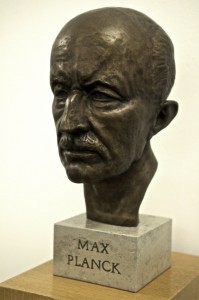Posted by Roberta Grimes • June 19, 2015 • 6 Comments
Quantum Physics, Understanding Reality
A frustrating but still amusing hobby is watching scientists who are bound  by a “fundamental dogma” of atheistic materialism continue to stumble toward a consciousness-based understanding of reality… by exhausting every other possible theory. Some readers of this blog have reproached me for being too hard on mainstream science. How is it possible that universities in the twenty-first century still are enforcing something so inane as a fundamental dogma about anything?
by a “fundamental dogma” of atheistic materialism continue to stumble toward a consciousness-based understanding of reality… by exhausting every other possible theory. Some readers of this blog have reproached me for being too hard on mainstream science. How is it possible that universities in the twenty-first century still are enforcing something so inane as a fundamental dogma about anything?
It is, sadly, all too possible. Watch a brilliant professor who is on the cusp of actually discovering how consciousness interacts with the brain take on a deer-in-the-headlights look when someone suggests to him that his theory of reality is rather close to one that was first advanced by an eighteenth-century bishop.
Donald D. Hoffman Ph.D. is a Professor of Cognitive Science at the University of California, Irvine. His TED Talk on the fact that we are not perceiving an accurate and objective reality is simple and enlightening, and I urge you to watch it all; but if your time is short, I’ll summarize what for our purposes are the important parts and then urge you to watch the last few minutes.
Dr. Hoffman begins by asking, “What is the relationship between your brain and your conscious experiences?” He believes that the reason this problem has so far proven to be insoluble is not that its solution is beyond our capability. He suggests instead that we can’t solve what scientists call the “hard problem” of consciousness simply because we have made an incorrect assumption. We have assumed that we are perceiving reality accurately.
Dr. Hoffman has done simulations based on the theory of evolution, and has found that evolution does not favor our seeing an accurate objective reality. He tells us that one-third of our brain’s cortex is engaged in vision, which is an astonishing fact all by itself when you consider all the other functions that traditional scientists ascribe to the brain. But “Is it true that accurate perceptions are fitter perceptions”? “Does natural selection favor seeing reality as it is?” Dr. Hoffman reminds us that fitness, and not objective perception, is the key to our evolutionary survival. He has run hundreds of thousands of evolutionary game simulations, and he has discovered that accuracy of perception of an organism’s surroundings seems to be beside the point: nearly always it is fitness alone that is most evolutionarily successful. We are the product of our evolution, so he concludes that we – like all other animals – are not perceiving reality as it objectively is.
So calculations based in the theory of evolution reveal that “Perception is not like reality, and reality is not like our perceptions.” “There is something that exists when we don’t look, but it’s not space-time and physical objects.” “That reality – whatever it is – is the real source of cause and effect in the world. Not brains or neurons. Brains and neurons have no causal powers.” “What does this mean for the mystery of consciousness?”
Now we come to his point, and it’s a wonderful one. “Perhaps reality is some vast interacting network of conscious agents, simple and complex, that cause each other’s conscious experiences.” This is an insight very close to what we have learned about reality from the afterlife evidence, which is simply that all that exists is infinitely creative Mind, and each of our minds is a part of that Mind. Eureka!
Or… maybe not. As you will shortly see, there are places where this earnest fellow feels that he cannot go, even though he is touchingly enthusiastic about his liberating insight. “Once we let go of our massively intuitive, but massively false assumption about the nature of reality, it opens up new ways to think about life’s greatest mystery.” “I bet that reality will turn out to be more fascinating and unexpected than we ever imagined!”
Then at the end of Dr. Hoffman’s talk, he is asked whether his work doesn’t support the work of Bishop George Berkeley (12 March 1685 – 14 January 1753), who supposed that consciousness causes matter and not the other way around. The question comes just after 21:00 on the clip linked above, and I urge you to watch it so you can see the horror with which this heretofore confident and cheerful scientist greets this dread suggestion. Dr. Hoffman fumbles that Bishop Berkeley was a “deist” while the look on his face says, No! Can’t go there! The theory that consciousness does not arise in the brain is something close to a third rail of science: you touch it, and your career dies. So Dr. Hoffman recovers with the statement that what he is talking about here is “conscious realism – quite a different approach.” Although why it is different is a puzzler to me.
Dr. Hoffman is a brilliant and thoughtful research scientist. And what he is working on is close to the same insight – but arrived at from a different direction – that was advanced by Max Planck, who was the father of quantum mechanics. In 1931 Dr. Planck said, ”I regard consciousness as fundamental. I regard matter as derivative from consciousness. We cannot get behind consciousness. Everything that we talk about, everything that we regard as existing,  postulates consciousness.”
postulates consciousness.”
He said in 1944, “As a man who has devoted his whole life to the most clear headed science, to the study of matter, I can tell you as a result of my research about atoms this much: There is no matter as such. All matter originates and exists only by virtue of a force which brings the particle of an atom to vibration and holds this most minute solar system of the atom together. We must assume behind this force the existence of a conscious and intelligent mind. This mind is the matrix of all matter.”
Consciousness is the water in which we swim like fish, so immersed in it that we know no other reality. The evidence that it does not and could not arise from a material brain is so manifold at this point that the fact that serious scientists stuck with the foolish dogma of atheistic materialism still waste their time trying to figure out how consciousness arises in the brain makes me sad. What a waste of time and talent! We can take heart, though, from the work of pioneering researchers like Donald Hoffman, whose curiosity is such that no amount of peer-pressure bullying will entirely silence them. Dr. Hoffman is right. And he will win.
Sad is a good word to use here to describe where much of science is today. The words dogma and doctrine should never be associated with true science. Virtually every axiom (a statement that is self evidently true) proposed by science has sooner or later been overturned. This is how science progresses new postulates question current axioms and research endeavors to test and record results. Einstein’s new physics replaced the assumed axioms of Newton. On Einstein’s heels came Quantum and since then all axioms must be suspect and subject to unhampered question, but instead, much of science still thinks and and acts from logic and linear Newtonian reasoning. This is the acceptable paradigm, and a Gospel that most in science hold as inviolate. Yes, sad.
Great insights, Mike – Thank you! I think you’re right in observing that since the advent of quantum physics mainstream physics has become more rigid rather than less so. The problem seems to be its enforced dogma of atheistic materialism that was seizing universities at about that time, and which has severely hampered research in most scientific fields for at least a century. It would be a relief for young physicists to have the dogma shown as soon as possible to be foolish nonsense, so they can look forward to spending most of their careers at last once again doing open-minded science!
Roberta, it’s another extra fine article. You’re correct, the reductionist/materialists know they’re in trouble with the “hard problem” of consciousness and are working over time to come up with something that can explain the brain producing consciousness.
Here’s a recent lame attempt by Dr. Oliver Sacks and several others to give a biological explanation in Scientific American. A Christof Koch, head of the Allen Institute for Brain Science, thoroughly rebuts them.
http://blogs.scientificamerican.com/guest-blog/exclusive-oliver-sacks-antonio-damasio-and-others-debate-christof-koch-on-the-nature-of-consciousness/
You and other readers might like this recent article by Dr. Deepak Chopra on why Artificial Intelligence(AI) will never be really intelligent nor really consciously aware.
http://www.sfgate.com/opinion/chopra/article/Why-Intelligent-Computers-Are-Dumber-Than-Your-6295231.php
And finally, on this week’s Whitely Strieber’s “Dreamland”, Dr. Eben Alexander and his partner Karen Newell are interviewed by William Henry. In the last segment he gives a powerful rebuttal to all the materialist theories coming out now on the brain supposedly producing consciousness.
http://www.unknowncountry.com/dreamland/latest
One last thing. How is Dr. Hoffman contributing when he backs away at the last minute with endorsing consciousness operating through the brain with his ambiguous “conscious realism” explanation?
Thanks, and hope all this contributes something!
You certainly have contributed, Michael – thank you! This is such a difficult concept for most of us to get our minds around that anything we can give people to read or listen to or think about is wonderfully helpful.
And – yes – even Dr. Hoffman is being helpful. After having been stuck for a century in a belief-system based on the odd dogma of atheistic materialism, most mainstream research scientists now working seem to know – as you point out – that consciousness cannot possibly be generated by the brain. But they still have families to support and careers to somehow finish out! What they need are bridges that they can begin to venture across while still maintaining their formal connection with traditional science, and people like friend Hoffman can be such a bridge. In pursuing the truth where it leads while remaining within the university, he is helping to break the walls down for us all.
Here’s where I stumble with Hoffman…
“Dr. Hoffman has done simulations based on the theory of evolution, and has found that evolution does not favor our seeing an accurate objective reality.”
On one level Hoffman seems to imply there is an objective reality that our sensory faculties reject for reasons of survival. At other times, he calls himself a radical monist and that no objects exist beyond perceptual interfaces. I’ve heard him say that Copernicus moves us closer to this objective reality. The implication is that we can converge towards a more accurate perception of an objective reality.
Hello Norman! You make a good point, of course. In reality, none of what we perceive as reality actually is real, and I guess I assumed when I first heard this talk that he was saying something like what I have learned to be true. So my mind supplied the rest of what I thought he meant, which was that evolution favored our not seeing an accurate objective reality because if we ever saw it, we would know that nothing in this materiality actually is real. But I may have given him more credit than was warranted. Thank you for pointing that out!